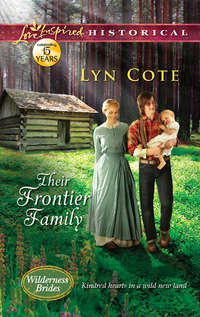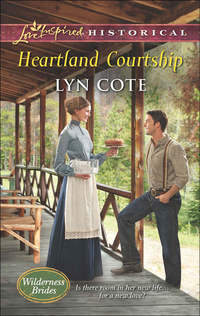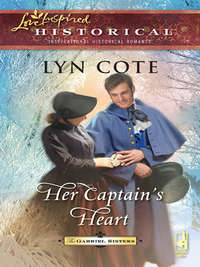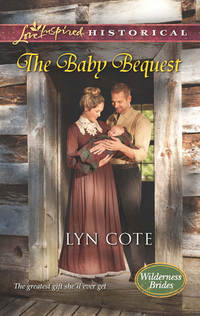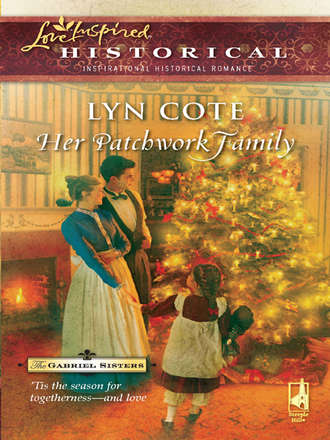
Полная версия
Her Patchwork Family
Now he regretted letting Felicity know that he had seen her outside in nightdress, no doubt chasing Tucker Stout. She was quite an unusual woman, willing to be caught in dishabille in order to help a child. And she was able to draw Camie in a way no other person had in his memory. Maybe it would do Camie good to pay a visit to the little girl at Miss Gabriel’s children’s home. Camie screamed again, a serrated blade through his soul. Something had to be done. The situation had become unbearable—for all of them.
After putting Katy and Donnie to bed with a story and a prayer for the night, Felicity walked out to the back porch. She couldn’t go to sleep with her nerves tangled and snared by unanswered questions about all she had observed and felt at the Hawkins’ home. In any event, she couldn’t stay within walls in the heavy summery heat. Barefoot, gloveless and hatless at last, she enjoyed the feel of the smooth hardwood under her soles and the air on her skin. She found Vista watching the sun, a molten ball of gold, lowering behind the maple trees along the alley. Vista sat fanning herself and holding a locket that hung around her neck.
Felicity hadn’t noticed the locket before. She hesitated to intrude on Vista’s privacy. Finally, she murmured, “May I speak with thee?”
Vista looked up, startled, and slipped the locket back out of sight. She studied Felicity and then nodded.
Felicity sat down on the wooden loveseat, leaning forward with her hands planted just behind her. She stared out at the sunset and wondered about the locket Vista felt the need to hide.
Felicity took herself fully in hand. “Of all things, I abhor gossip. But sometimes information is necessary. I would not want to say or do anything out of ignorance that might cause hurt or harm. Will thee give me some information?”
Vista made no response. Felicity waited, images of the sad little girl niggling her. Finally, Vista said, “Go ahead.”
“This evening I went to thank Tyrone Hawkins—”
“You mean Judge Hawkins?”
“Yes, the judge. Friends don’t use titles. We think they separate people and feed pride.”
“More than titles separate people around here.”
Felicity thought this over, Mrs. Thornton Crandall’s anger-twisted face coming to mind. “I was disturbed by my visit at the judge’s home.” More than disturbed. She pursed her lips. “Something is very wrong there. The little girl…”
Felicity couldn’t go on, couldn’t divulge the distress she’d witnessed. Her throat dammed up. Cicadas and a carriage going down the street alone broke the silence of evening.
“There is trouble in that house.” Vista’s voice was solemn. “That stuck-up Mrs. Crandall is Camie’s grandmother. Camie lost her mother and Mrs. Crandall took care of that child till the judge came home from war.”
Felicity waited for more, but none came. “I thank thee.” She certainly would not have to worry about Vista gossiping about matters at the children’s home.
Felicity rose and went into the house. Poor Camie had fallen into the hands of Mrs. Crandall. And had Camie’s mother taken after her own mother? Poor Camie. Lord, show me if Thee wants me to help this child and show me how. Please.
In midmorning two days later, even though her feet itched to walk off her lingering restlessness, Felicity ventured into town in the old carriage. In an act of faith, she had purchased new clothing for more orphans. Now she set out to find more children to wear those clothes. Flashes of memory—Camie’s wan face, her alarming outcries, the judge’s grim expression—circled in her mind like a train on a track.
With his drooping gray mustache and matching eyes, the groom let her down near the hectic wharf. “Miss Gabriel, you shouldn’t be down here by yourself. I should stay with you.”
This restriction of her freedom of movement chafed Felicity. Still, she smiled up at the man’s lined face. “I will not be alone. I always try to tread as close as I can to the Lord. Thee need not come back. I will walk home—”
“No, you won’t,” the man said, huffing. “Mrs. Barney wouldn’t like that at all, miss. Not at all. In an hour, I will drive back into town and wait for you by the post office over yonder.”
Felicity shook her head. “Very well, Abel Yawkey. I will do as thee wishes.” For now. “At the post office in an hour.” She consulted the watch pendant that was pinned to her collar.
She turned and headed down the less than clean streets near the wharf. The Mississippi River was the major trade route, transporting goods from the center of the nation down to the Gulf and thence to the world. She threaded her way through the steady stream of people going to and from the barges, but the loud voices and sounds of river traffic did nothing to cheer her. Camie’s cries for help echoed in her mind.
And the judge’s pain-lined face would not leave her.
Felicity walked and walked but did not see any children like the ones she had already taken home. Wondering if she should have come in the afternoon, she halted near where she had met Katy and Donnie on her first day in town.
“You in trouble, miss?” a deep voice asked.
She turned her head and looked into an older black man’s deeply lined face, lifted in a kind smile. “I am looking for needy children.”
“I’m Jack Toomey, Miss Gabriel. I saw you arrive in town a few days ago.”
“And thee already knows my name?” Felicity offered him her hand. She wasn’t pleased to hear that gossip had spread this far. But that wasn’t this man’s fault.
Shaking her hand, Jack matched her grin and raised it a few notches. “Yes, miss. This town isn’t as little as it was when I was a boy. But it’s still small enough that information spreads pretty quick.”
Felicity drew in a deep breath. “And what do the people of Altoona say of me?” From the corner of her eye, she glimpsed the policeman who had nabbed Tucker watching her talk to Jack Toomey. What was his name?
Jack rubbed his clean-shaven chin and ignored her question. His gaze was assessing. “You be a Quaker, right?”
“Yes, I am a member of the Society of Friends.” Hogan, that was the man’s name.
“The Quakers were friends to black people who were in bondage for a long time.”
“Yes, we voted against slavery in our Pennsylvania Friend’s Assembly in 1758.” Hogan was watching her closely. Did he resent her actions to help Tucker?
“Did you know that Altoona was a stop on the Underground Railroad?”
“Yes, in fact, the house I inherited from Mildred Barney was one of those stops. There is a concealed room in the attic.”
Jack laughed. “No doubt Sister Vista told you about that. She made use of it herself.”
Felicity nodded. She filed away that bit of Vista’s history and returned to her object for the day. She gazed at the foot and horse traffic.
“You be looking for more children for that orphans’ home of yours?”
“Yes, I am. So far I have only three. Does thee know of any children who need a home?”
“You willing to take in black children?” he asked.
“Of course.”
Jack smiled broadly. “I think there are a few children our church has been feeding and trying to find permanent homes for.”
“Excellent. Would thee please bring them to Mildred Barney’s house?”
“I surely will.” Jack bobbed his head. “And if you go along the wharf, you might find a few more homeless children. I saw some begging this morning at the back of the bakery for stale bread.”
“Thank thee, Jack Toomey. I will look forward to receiving those children.” Felicity waved and walked along the quay. Men with bulging muscles wrestled large sacks and wooden crates onto and off barges. Passengers from a riverboat were filing down a walkway onto shore. Then two little boys ran from a side street and began begging there. A shabby older man followed them out of the alley and looked around in what struck Felicity as a furtive manner.
She paused and observed him until he blended into the jostling crowd. Then she focused on the two boys. Both towheaded blonds, they looked to be around eight to ten years. It was hard to estimate age accurately since lack of proper food always slowed or stunted growth not only of the body but also of the mind. After the passengers had all passed by, Felicity approached them. “Good day, children.”
They both looked up, their blue eyes alert and wary, without the innocence of childhood. Then they looked around as if fearing someone. The boys’ faces were grimy and their clothing tattered. The sight twisted her heart. How could people just pass them by? But then times were hard after the war. And in any season some people had little pity to spare for others.
“My name is Felicity Gabriel and I have a home for children who don’t have a family. Would thee like to visit my home and see if thee would like to stay?”
They stared at her, no comprehension in their eyes, only suspicion.
She smiled. “I have three children who have decided to stay with me, a little girl and her brother and another older lad. Would thee—”
“What do we got to do for you?” the older of the two asked, casting a nervous glance over his shoulder.
Their distrust grieved Felicity but no doubt it had been learned the hard way. She looked in the direction of the boy’s glance but saw nothing worrying. “Thee must only follow the house rules. I am a Quaker and this is the kind of work we do. We are honor-bound to help others.”
“Would a visit include lunch?” the older one asked, scrutinizing her.
“Yes, indeed it would. If thee will come with me—” she paused to look at her pendant watch “—my carriage is waiting near the post office.” She turned and walked away without looking back, letting the two decide whether to come along or not.
When she reached Abel Yawkey, he got down and helped her into the carriage. The two boys climbed in after her, still looking guarded and edgy.
Felicity was delighted but hid it. She must present a calm presence before the distrustful children. But her spirit lifted, which she desperately needed after being haunted by the tormented eyes of little Camie Hawkins—and of her father.
Felicity and the children ate on the back porch. Vista had enforced her clean-hands-and-face rule, and then served a delicious lunch of Welsh rarebit. The new boys, Butch and Willie, had eaten three helpings and helped finish off a dozen large oatmeal cookies.
Felicity had introduced the new children to Katy, Donnie and Tucker. For just a moment, she had the notion that the boys knew Tucker. But Tucker had shown no evidence of this. At first, there was only silence at the table. But after the new children had eaten their first helping, they started eyeing the others already in her care. Would these two stay for more than just lunch?
Vista came out and put down another dish of melted cheddar cheese on toast and said, “Miss Felicity, will you come into the kitchen a moment?”
“If you will excuse me, children.” Felicity left her napkin beside her plate. Inside, she looked to Vista questioningly.
“I called you in to give the new chil’run a chance to talk to Katy and Tucker. They will trust what they say more than what you or me say.”
Felicity beamed at Vista. “How wise thee are.”
Vista shrugged. “I don’t know if I’m wise, I just know how it feels…”
Felicity looked into Vista’s eyes, waiting. But the lovely housekeeper left the rest of her sentence unsaid, making Felicity wonder again about the locket. She perceived its outline under Vista’s demure collar but still did not ask. After a few minutes, the two women carried out more milk to the children.
“Well,” Felicity said as brightly as she could, “are thee two staying or returning to the wharf?”
The boys looked to each other and then to Tucker.
Felicity was glad she was watching closely or she might have missed what came next. Tucker gave the slightest nod.
Butch and Willie turned their gazes up to her. “We’ll give it a try, lady.”
“You supposed to call her Miss Felicity,” Katy prompted. Vista had insisted that the children follow her example.
“Miss Felicity,” the two said in unison, and Tucker nodded in approval.
Felicity’s awareness zoomed. It was clear that Tucker and these children knew each other. How? Just because they had all lived on the streets? Felicity decided not to let herself be caught napping. She must be as gentle as a dove but wise as a serpent.
Later, Felicity looked out the window at the two new boys who—in between digging in the dirt for fun—were weeding the side garden. Then she looked back down at her sketch of needed alterations to Mrs. Barney’s house to make it into a home for many children.
Turning her mind to the issue at hand, Felicity smiled at the builder. The man said, “I’d have to see if any of the interior walls are load-bearing before I start taking them down.”
“Yes, I don’t want to bring the roof down on our heads.” Felicity grinned, trying to lighten the exchange. The builder seemed to be brooding on something. “I also want thee to make an outside staircase on each side of the house in case of fire. I need the children to be able to get out safely.”
“Outside staircases?” He looked at her sketch and grimaced. “That will give a very odd appearance to this house.”
“With so many more children than in a usual family home, we must take extra precautions. And I want to add a small room off the kitchen where the children will bathe. I’d like an indoor pump and stove in that room.”
He looked dubious. “This is a lot of work. And I have other jobs—”
Whether due to his hesitance to work for a woman or something else, she would have none of it. My children can’t wait just because thee doesn’t want to bother getting the work done. “I suggest that thee hire more help.”
He rubbed the side of his nose. “These projects change the whole appearance of this house. I hate to take such a lovely dwelling and—”
Oh, that’s what this is about. More consequences of Mrs. Crandall’s gossip. “A house filled with healthy, joyful children is what I think is beautiful. Now if thee cannot take on this work immediately, I will contact another builder.”
Конец ознакомительного фрагмента.
Текст предоставлен ООО «ЛитРес».
Прочитайте эту книгу целиком, купив полную легальную версию на ЛитРес.
Безопасно оплатить книгу можно банковской картой Visa, MasterCard, Maestro, со счета мобильного телефона, с платежного терминала, в салоне МТС или Связной, через PayPal, WebMoney, Яндекс.Деньги, QIWI Кошелек, бонусными картами или другим удобным Вам способом.



